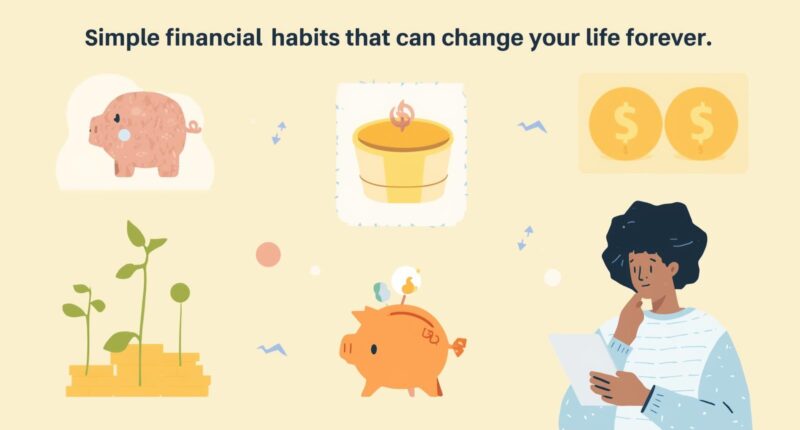Simple Financial Habits That Change Your Life Forever
Introduction: Building Wealth Through Daily Discipline
Financial freedom doesn’t come overnight — it’s the result of consistent, simple financial habits practiced daily.
While most people chase big investment wins, the real secret to lasting success lies in small, consistent actions that build wealth over time.
From budgeting and saving to smart spending and investing, these financial habits can truly change your life forever — bringing peace of mind, stability, and independence.
Let’s explore how to start transforming your financial future, one habit at a time.
Why Financial Habits Matter
Your financial habits determine your long-term financial health far more than your income does.
Even high earners struggle when they lack discipline, while modest earners thrive when they practice consistency.
The Power of Financial Discipline
-
Builds confidence in managing money.
-
Helps avoid debt and unnecessary stress.
-
Creates a foundation for future investments.
-
Increases savings and reduces financial anxiety.
-
Ensures long-term financial freedom.
Developing strong habits is the difference between surviving and truly thriving.
Table – Bad Money Habits vs. Good Financial Habits
| Aspect | Bad Money Habits | Good Financial Habits |
|---|---|---|
| Spending | Impulse purchases | Planned and intentional spending |
| Saving | Ignoring savings | Paying yourself first every month |
| Budgeting | No clear plan | Tracking income and expenses |
| Debt Management | Using credit for lifestyle | Paying off debts quickly |
| Investing | Avoiding investments | Investing regularly for the long term |
Small daily improvements lead to massive long-term results when it comes to your finances.
Habit #1 – Create and Follow a Budget
The first step to financial success is understanding where your money goes.
A budget helps you control spending, plan goals, and avoid surprises.
How to Build a Simple Budget
-
Write down your total income.
-
List all fixed expenses (rent, utilities, insurance).
-
Allocate savings before spending on extras.
-
Track every expense for at least 30 days.
-
Review and adjust monthly.
Budgeting gives you financial clarity and control — turning chaos into confidence.
Habit #2 – Pay Yourself First
The concept of “pay yourself first” is simple but powerful.
Before paying bills or making purchases, set aside a fixed percentage of your income for savings or investments.
Even saving 10–20% of your income consistently builds a safety net for emergencies and future opportunities.
Treat savings as a non-negotiable expense — not an afterthought.
Link: For more tips on managing money wisely, check out our guide — Everyday Lifestyle Choices That Save You Thousands.
Habit #3 – Eliminate High-Interest Debt
Debt is one of the biggest barriers to financial freedom.
While some loans (like mortgages or student loans) may be manageable, credit card debt or personal loans with high interest can quickly spiral out of control.
Steps to Reduce Debt
-
Pay off high-interest debts first (debt avalanche method).
-
Avoid borrowing for non-essential expenses.
-
Refinance or consolidate loans for better rates.
-
Commit to paying more than the minimum balance.
Becoming debt-free gives you the freedom to grow wealth instead of constantly paying for the past.
Habit #4 – Build an Emergency Fund
Life is unpredictable. Medical bills, job loss, or car repairs can disrupt financial stability.
An emergency fund protects you from falling into debt when unexpected expenses arise.
How to Build One
-
Aim to save 3–6 months of living expenses.
-
Keep the fund in a separate, easy-access account.
-
Refill it immediately after using it.
This simple habit brings peace of mind — knowing you’re ready for whatever life brings.
Habit #5 – Start Investing Early
Investing is how you turn savings into long-term wealth.
Even small, consistent investments grow significantly over time due to compound interest.
Smart Investing Tips
-
Start with low-cost index funds or ETFs.
-
Contribute monthly, even in small amounts.
-
Diversify your portfolio across assets.
-
Avoid emotional decisions during market changes.
The earlier you start, the easier it becomes to achieve financial independence.
Link: Learn more about beginner-friendly investment strategies from Investopedia’s Personal Finance Guide.
Habit #6 – Track and Review Your Finances Regularly
Financial awareness is essential.
Set aside time each week or month to review your spending, savings, and goals.
Use budgeting apps like Mint, YNAB, or Google Sheets to stay organized.
Review Checklist
-
Are you sticking to your budget?
-
Is your savings rate increasing?
-
Have your investments grown or changed in value?
-
Can any expenses be reduced or eliminated?
This ongoing review process ensures you stay accountable and adaptable as your financial situation evolves.
Habit #7 – Live Below Your Means
One of the most powerful financial habits is learning to spend less than you earn.
It’s simple — but not easy. By adopting a minimalist and intentional lifestyle, you’ll save more, reduce stress, and build lasting wealth.
Ways to Live Within Your Means
-
Avoid lifestyle inflation (don’t upgrade every time your income rises).
-
Focus on needs, not wants.
-
Delay gratification and make thoughtful purchases.
-
Appreciate simple joys that don’t cost money.
This mindset shift creates financial stability and lasting happiness.
Habit #8 – Keep Learning About Money
The world of finance changes constantly. Staying informed helps you make smarter choices about savings, taxes, and investments.
Ways to Keep Learning:
-
Read books like Rich Dad Poor Dad or The Millionaire Next Door.
-
Follow reputable finance blogs or YouTube channels.
-
Join online communities focused on personal finance.
Knowledge is the foundation of financial confidence and long-term success.
Conclusion: Small Habits, Big Financial Transformation
Becoming financially successful isn’t about luck — it’s about consistency.
By developing simple financial habits like budgeting, saving, and investing early, you build a lifestyle of stability, security, and growth.
Start small today — one habit at a time.
In a few years, these small decisions will compound into financial freedom that lasts a lifetime.









